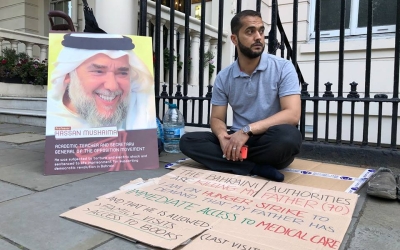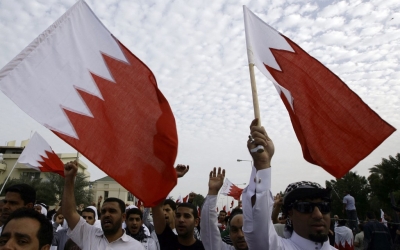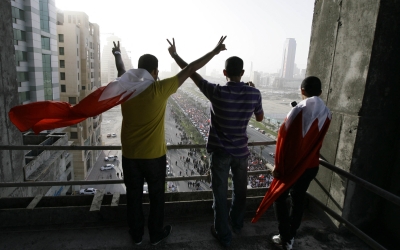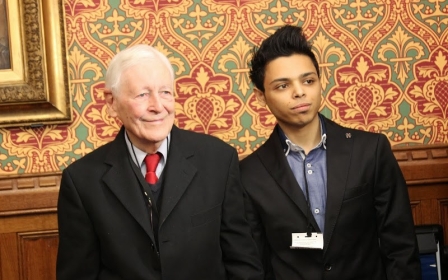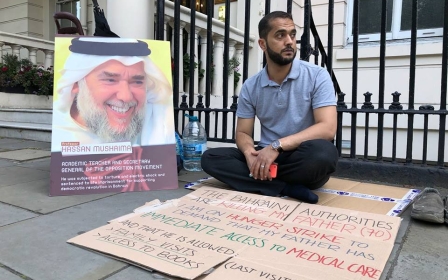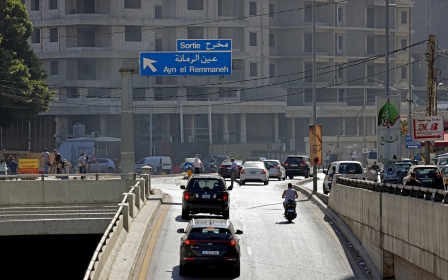Bahraini activist on hunger strike in London demands release of political prisoners
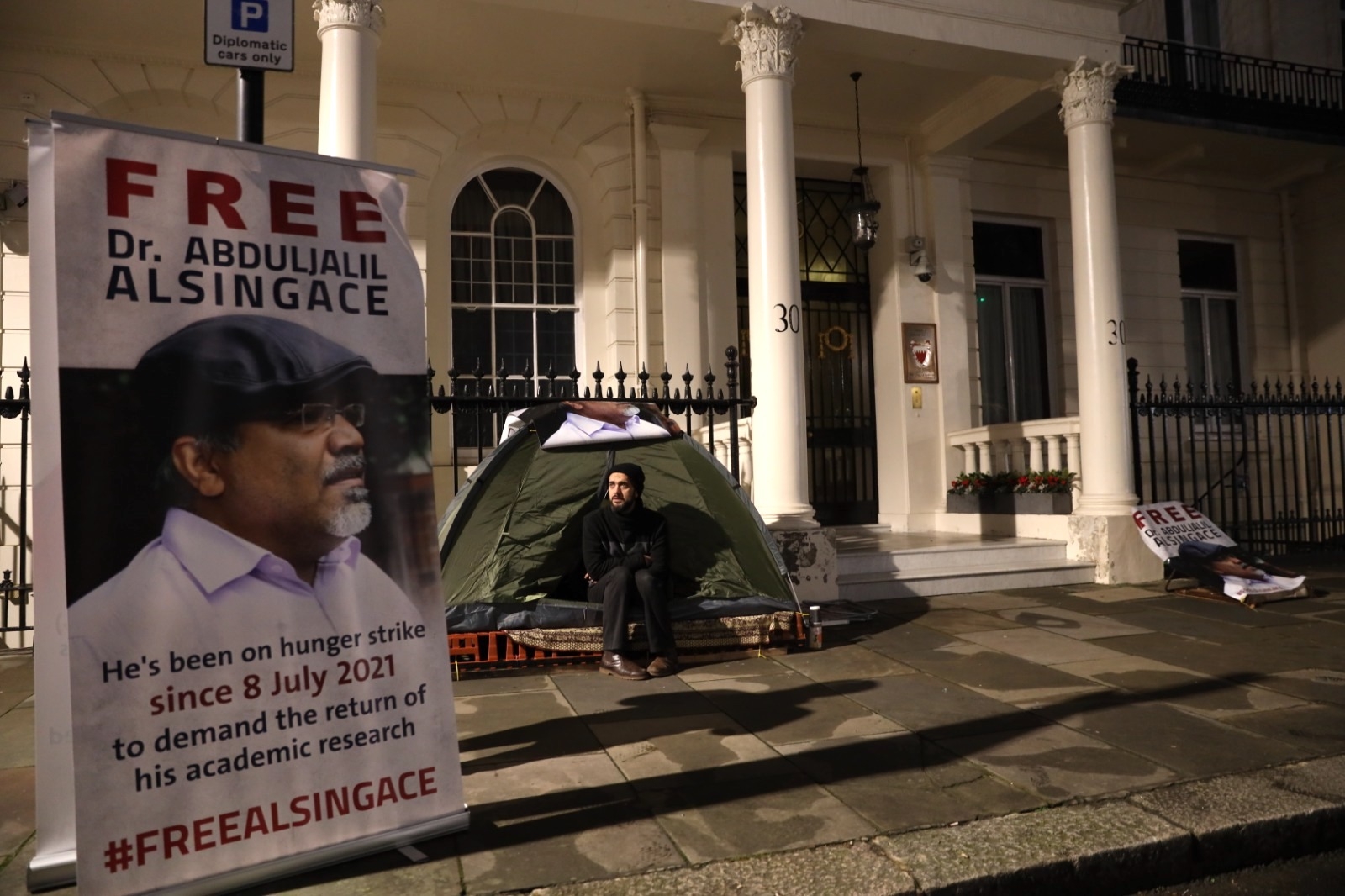
Ali Mushaima, son of an imprisoned Bahraini opposition leader, entered his 21st day of hunger strike outside the Bahraini embassy in London on Wednesday.
The campaigner has been protesting against the detention conditions of his father Hassan Mushaima and those of academic and activist Abduljalil al-Singace, who were arrested and sentenced to life in prison over their role in leading Bahrain’s 2011 pro-democracy uprising.
Singace is also on his 160th day of a hunger strike in a Bahraini prison cell, demanding that research he wrote by hand over four years be returned to his family, after it was confiscated in April by prison authorities in the Gulf kingdom.
The scholar has lost over 20kg, with family members reporting that he has been refusing IV treatment for over two weeks, following a decision by authorities to stop his weekly video calls with his family.
He suffers from chronic medical conditions, including post-polio syndrome, and requires crutches or a wheelchair to move.
New MEE newsletter: Jerusalem Dispatch
Sign up to get the latest insights and analysis on Israel-Palestine, alongside Turkey Unpacked and other MEE newsletters
“I felt it was time to take matters into my own hands and demand that the UK act to save Singace and release him, along with my father and all political prisoners in Bahrain, once and for all,” Mushaima told Middle East Eye.
Ali has already lost seven kilograms, according to Sayed Ahmed Alwadaei, director of advocacy for Bahrain Institute for Rights and Democracy (Bird). His father, 74, suffers from multiple diseases: he is in remission from cancer and also has high blood pressure, diabetes and related complications, including swelling in his legs and feet, which causes extreme pain and inhibits his movement, according to his family. They also told Bird that Hassan has lost the ability to hear in his right ear, partly due to torture.
“I salute the courage, bravery and determination that Ali is showing in this freezing weather, all in order to shed light on a decade of injustices inflicted upon Dr Singace and his father, Hassan Mushaima,” said Alwadaei.
Deteriorating health
Hassan Mushaima has been in the same medical facility as Dr Singace since July and both allege systematic discrimination, ill- and degrading treatment and medical negligence in violation of their rights.
“I cannot simply wait and do nothing, fearing for the day when I will receive a call saying that my father… or Dr Singace have died in custody,” said his son.
Middle East Eye has reached out to the Bahraini embassy in London for comment on the allegations, but had not received a response by time of publication.
On Monday, Human Rights Watch renewed its calls for Bahraini authorities to release leading opposition activists, including Dr Singace and Mushaima. Since Ali Mushaima has begun his hunger strike, seven British MPs have visited him outside the embassy.
Sir Peter Bottomley, Father of the House of Commons and Conservative MP, took to Twitter to call for the release of political prisoners in Bahrain.
“I’ve made attempts to work with human rights organisations, MPs and diplomats without any progress,” said Mushaima.
Since last July, similar calls for the release of Singace and Hassan Mushaima have been made by UK MPs, 16 international NGOs, led by Amnesty, and 100 global academics.
The EU parliament also called for Singace’s unconditional release in a resolution passed earlier this year.
Alwadaei told MEE that Bird will be holding a press conference outside Bahrain’s embassy in London on Thursday at 2pm to commemorate Bahrain’s national day and to stand in solidarity with Ali Mushaima as he raises the plight of Dr Singace and his father.
British MPs, such as Scottish Liberal Democrat Wendy Chamberlain, NGO representatives and rights groups are expected to speak at the press conference.
This is not Ali's first hunger strike. In 2018, after 44 days on hunger strike, losing 16kg, he managed to secure medication for his father’s cancer treatment.
Military and strategic interests
Before coming to the UK, Ali was a bus driver and activist in Bahrain. He had his Bahraini nationality revoked after being sentenced to 45 years in prison, and came to Britain as a political refugee in 2006 - where he has remained active in campaigning for rights in his country.
Dozens of activists have been imprisoned during and since a major crackdown to quell protests against the ruling Bahraini royal family in 2011.
Following the uprising in February 2011, the Bahraini government declared martial law. While that officially ended in June of the same year, opposition activists and politicians have since been targeted. Demonstrators have frequently clashed with security forces, who have been targeted by bomb attacks.
Bahrain has accused the opposition of undermining security and blamed the bombings on Iran and Lebanese group Hezbollah. Both deny any involvement in Bahrain's unrest.
Britain, meanwhile, has strengthened its ties with Bahrain despite Manama's ongoing crackdown. Earlier this year, the UK opened a permanent military base inside the island country.
In July, a parliamentary report revealed that the UK government has channelled over £53m of taxpayers' money to Gulf regimes - including Bahrain - in a secretive funding scheme that places the UK “at risk of complicity” in human rights abuses in the country.
Activists like Alwadaei fear the UK’s military connections and strategic interests with Bahrain will prevent it developing the political will to demand the release of pro-democracy activists.
“For Ali, this is a last resort to save their lives,” said Alwadaei. “Ali’s brave action can only work if people care and express their support and solidarity.”
Middle East Eye delivers independent and unrivalled coverage and analysis of the Middle East, North Africa and beyond. To learn more about republishing this content and the associated fees, please fill out this form. More about MEE can be found here.


